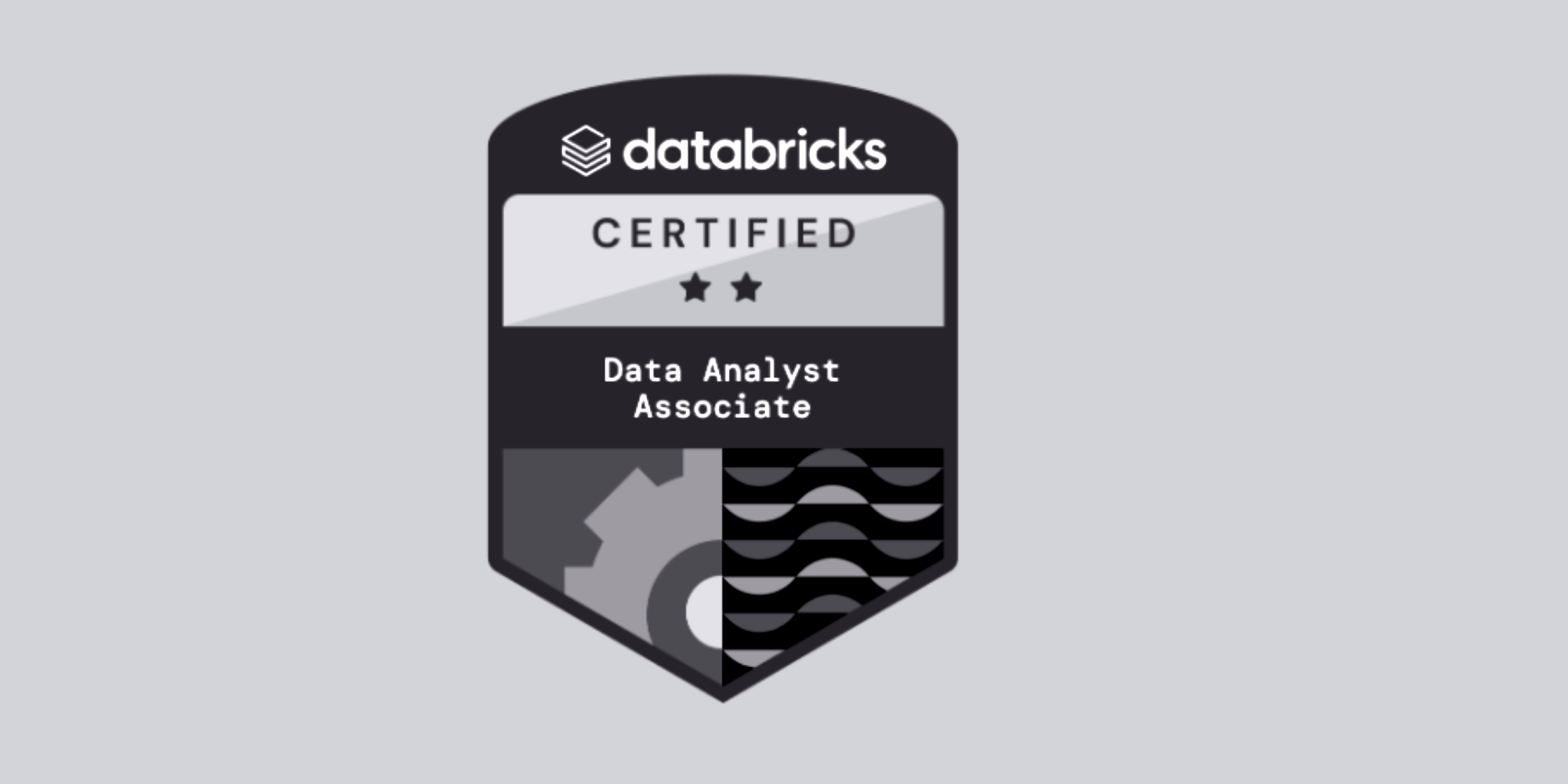Databricks Certified Data Analyst Associate - How to Pass?

Introduction
Hello, and a very warm welcome to my website! If you're new here, I’m a Business Intelligence Specialist working in real estate in London. My day-to-day involves a lot of data wrangling, creating and delivering insights, and managing a variety of stakeholders. My data toolkit includes SQL, Python, Alteryx, and Tableau. However, over the past six months, we have been transitioning from Alteryx to Databricks.
Thankfully, the journey for me has been smooth (touchwood!), and here’s why:
A. I was already well-versed in SQL and Python.
B. I like to consider myself tool-agnostic - meaning, as long as your fundamental data analytics skills are strong, you can pick up any analytics tool with ease.
In this blog, I’ll share my learning experience with Databricks and how I successfully passed the Databricks Certified Data Analyst Associate exam.
We will cover:
- The Exam Structure
- How to Prepare Effectively
- Must-Know SQL & Databricks Concepts
- Booking and Taking the Exam
PS: If you’re looking to get started with Alteryx instead, I’ve got you covered! Check out my other blogs that will help you upskill in Alteryx for FREE!
Unleash Your Data Wizard: Mastering Alteryx for FREE
Alteryx is a great skill to add to your profile as a data analyst. This blog walks you through how to get started with Alteryx for free and get Alteryx Core certified.
Alteryx Advanced Certification: Preparation and Tips
Already Alteryx Core certified and looking to take the Advanced certification? This blog will guide you through the preparation process and help you ace the exam.
Exam Structure
You can find all the topics covered in the Databricks Certified Data Analyst Associate exam in this guide: Databricks Exam Guide
Here’s a quick breakdown of the exam:
- Duration: 90 minutes
- Questions: 45 multiple-choice questions
- Proctoring: Online, monitored via video camera
- Exam Fee: $200
- Retake Policy: If you fail, you must wait 14 days before reattempting, and you’ll need to pay the fee again.
I’m sure you don’t want to go through the hassle of retaking the exam—so let’s dive into how to prepare efficiently and pass on your first attempt!
Preparing a Winning Strategy
I have been working with Databricks for about six months now. While I was confident in my SQL skills and platform experience, I decided to take a more structured approach to ensure I was fully prepared for the exam.
I started by reviewing the exam syllabus and identifying the areas I needed to study or revise. Over two weeks, I dedicated a few hours each evening after work, along with focused study sessions on weekends. By the end of my preparation, I felt confident about passing the exam.
Here’s how I went about it:
1. Complete the Courses in Databricks Academy
To begin my preparation, I completed the following courses on Databricks Academy:
- Lakehouse Fundamentals
- Data Analysis with Databricks
Both courses are self-paced and provide foundational knowledge of Lakehouse concepts and Databricks SQL. While I had initially completed these courses in September last year, I decided to go through them again to reinforce my understanding. Repeating the courses helped me grasp some concepts even better since I was already familiar with the terminology.
This time, I focused specifically on:
- Medallion Architecture
- Cluster Setup
- Managed vs. Unmanaged Tables
- Advantages of Delta Lake
- Building Databricks Dashboards
These topics are heavily tested in the exam, and since I wasn’t using them regularly at work, I made sure to review them thoroughly.
2. Practice Exams
2.1 Free of cost
Next I found a YouTube video: How to Pass the Databricks Data Analyst Exam (Free Practice Test) which provided an excellent resource with 80 practice questions and answers: Youtube Downloads - Google Drive. I worked through these, immediately researching any unfamiliar concepts.
There were certain window functions that I could not wrap my head around, so I went onto my favourite tutor - Chat GPT and asked it to explain to me step by step with some dummy data and instantly understood seeing the query come alive.
2.2 Paid
I went a step further with my preparation by doing the Udemy practice papers recommended by a colleague. While these are paid, I found them to be excellent value. The course is typically priced at around £20, but I managed to purchase it for £13 during a sale (roughly the cost of three coffees 😉). These practice papers proved invaluable, both for additional practice and for boosting my confidence before the exam. The course includes three practice tests, offering flexibility in how you approach them. I chose to do the first one in practice mode to familiarize myself with the format, then completed the other two in exam mode to check my pace and readiness.

Must-Know SQL & Databricks Concepts
Here are some key topics that I found crucial for the exam:
SQL Concepts:
- Grouping Sets/Roll/Cube - Difference between three functions & their outputs
- Transform/Collect/Expand - Higher order functions and their implementation
- Parsing JSON/Array Date - Parsing semi-structured data
- Merge Into /Insert Into / Copy Into - Difference between three functions & their use cases
- Delta Time Travel - Accessing historical operations performed on the table
Databricks Concepts:
- Databricks SQL Alerts
- Scheduling Dashboards
- Query Parameters
- Access Controls
- Persistence of Scope of Tables/Views
- Medallion Architecture
- Managed vs External Tables
Booking and Taking the Exam
You can book the Databricks Certified Data Analyst Associate exam by clicking the Registration link at the bottom of the official exam page.
Once booked, you’ll receive an email with the exam link. I opted to take the exam immediately rather than scheduling it in advance.
Important Tips:
- Use your personal email to register for the exam.
- Avoid using a work laptop, as it requires safe browser installation, which needs admin permissions.
- Ensure your desk is clear—no papers, devices, or distractions.
- You have to stay in front of the laptop during the 90-minute exam. No breaks are allowed
- Check that your camera works properly. (Mine stopped mid-exam, and I had to contact support, who kindly allowed me to resume after a reboot.)
Closing
I hope you found the preparation strategy shared in this blog useful. For any additional questions, I am reachable on LinkedIn.
Good luck with your exam. You got this.✨

